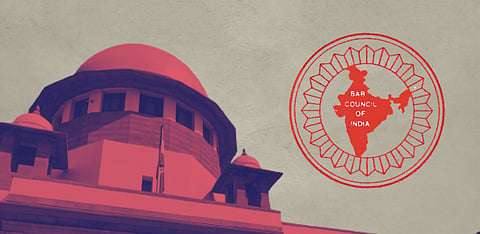

"When dealing with the entire legal fraternity is left to you, you need to come up with more concrete and clear propositions", the bench noted.
– –
ON Tuesday, a division bench of the Supreme Court comprising Justices Dinesh Maheshwari and Bela M. Trivedi, in the case of Common Cause versus Abhijat and Ors., directed the Bar Council of India (BCI), yet again, to submit preventative, concrete solutions to address the issue of strikes by lawyers.
The bench was hearing a contempt petition filed by the NGO Common Cause, through advocate Prashant Bhushan to, firstly, seek action against lawyers who abstain from work; secondly, it sought to issue directions to the BCI to incorporate appropriate rules, prohibiting strikes by advocates, in the 'Standards for Professional Conduct and Etiquette' framed under Section 49(1)(c) of the Advocates Act, 1961.
Advocate Ardhendumauli Kumar Prasad, representing the BCI, submitted that the Council is in deliberation with the state Bar Councils, who are stakeholders, to frame rules in this regard.
To this contention of the BCI, the bench expressed its dismay on the long-pending deliberations and solutions. Justice Maheshwari observed, "The Bar Council of India is composed of members drawn from state bar councils, which is a peculiar composition. So don't tell us that state bar councils are different from the BCI. For how long will these deliberations continue? If the BCI can't expedite the things that it needs to do, who else is going to?"
Responding to Prasad's contention, Justice Maheshwari observed that the BCI needs to step in to prevent a wrong from taking place and not wait for it to occur. "There need to be specific preventive measures and that is what the concern is. This is not a process that can be allowed to happen at its own leisurely pace," he remarked.
The bench reminded the BCI of the judgment in the case of Ex-Capt. Harish Uppal versus Union of India & Anr. delivered by the Supreme Court in 2002, and Justice Maheswari said, "Twenty years later, are we here to execute the Harish Uppal case again?"
The bench pointed out the delay by the BCI to put things in motion and expressed its disappointment with the BCI's failure to come forth with concrete steps. It emphasised the need for "reasonable and workable solutions", instead of inserting rules in the already existing framework. The bench highlighted the need for the BCI to function as a "responsible body" and to "show seriousness" towards the issue. "When dealing with the entire legal fraternity is left to you, you need to come up with more concrete and clear propositions," the bench noted.
Expressing its expectations of the BCI to present concrete solutions, the bench posted the matter for further hearing on March 16.
The contempt petition in the present matter was filed on account of the Delhi High Court Bar Association calling for abstinence of work for two days on July 22, 2015. The Association sought the tabling of the Commercial Courts, Commercial Division and Commercial Appellate Division of High Courts Bill, 2015 — which calls for the creation of dedicated courts for commercial cases at the trial court and high court-levels — along with the Delhi High Court (Amendment) Bill.
The petition pointed out that the bar associations, both in the high court and district courts, have repeatedly sought boycotts from all lawyers over the issue. According to the petition, advocates have obligations and duties to ensure the smooth functioning of courts, and they owe a duty to their clients. Lawyer strikes interfere with the administration of justice, the petition noted.
The petition referred to the landmark judgment in the Harish Uppal case, in which the Supreme Court held that lawyers have no right to strike or give a call for the boycott of courts. According to the judgment, a protest, if any is required, can be undertaken through other methods, including giving press statements, TV interviews, carrying banners and/or placards, wearing black arm-bands, peaceful protest marches outside court premises, and going on dharnas or relay fasts.
In July 2019, a division bench of the Supreme Court, comprising Justices Arun Mishra and Aniruddha Bose, directed the BCI to file data showing the implementation of its 'resolutions' and the pending disciplinary matters throughout the country with the Disciplinary Committees of various state Bar Councils.
In November 2022, the court urged the BCI to suspend the licence of lawyers in Odisha striking with the demand for a permanent bench of the Orissa High Court in Sambalpur.
On December 6, 2022, the BCI was directed by the court to file their notes on addressing the issue. The bench comprising Justices Maheswari and Sudhanshu Dhulia had pointed out the BCI's inability to prevent lawyers from going on strike.